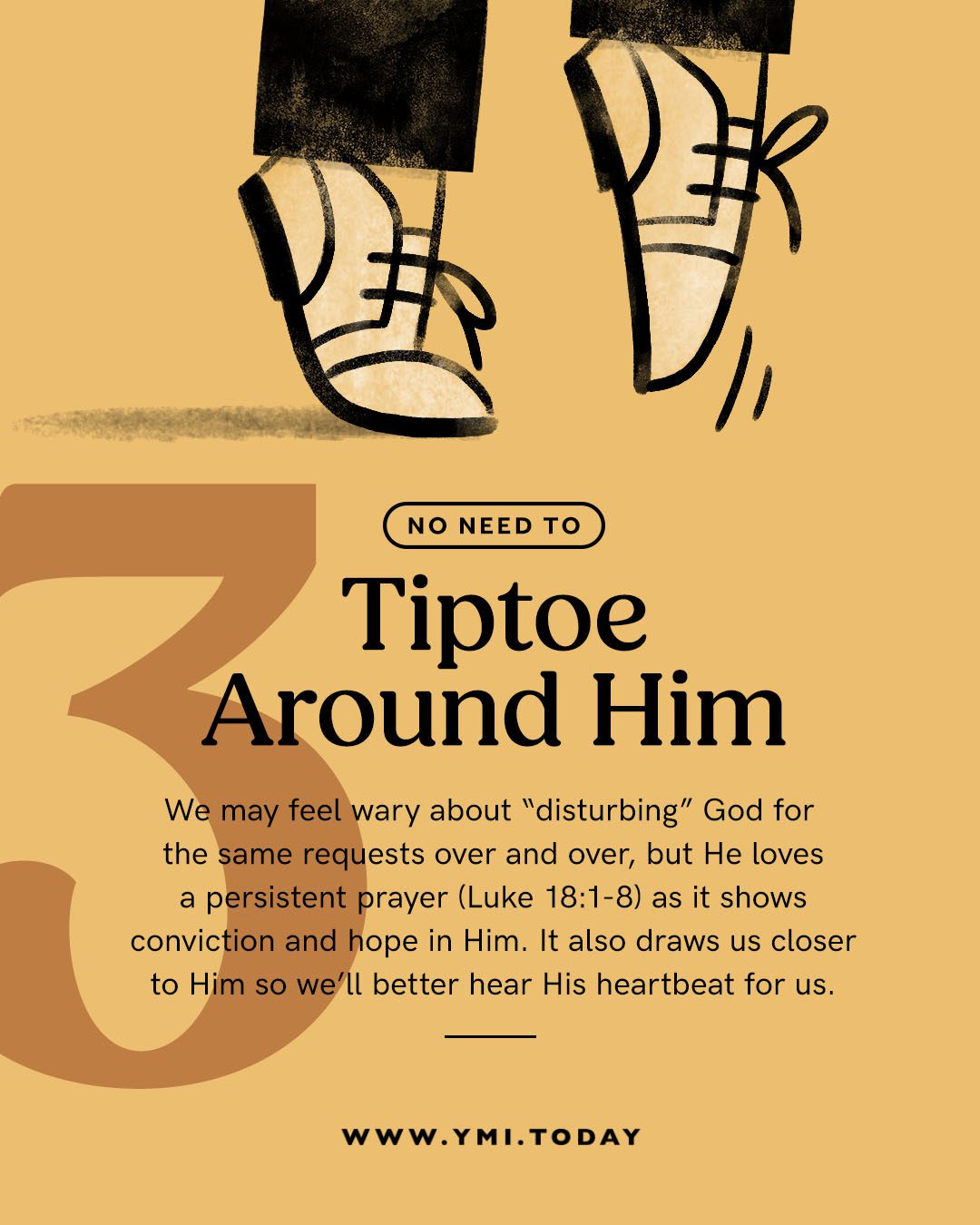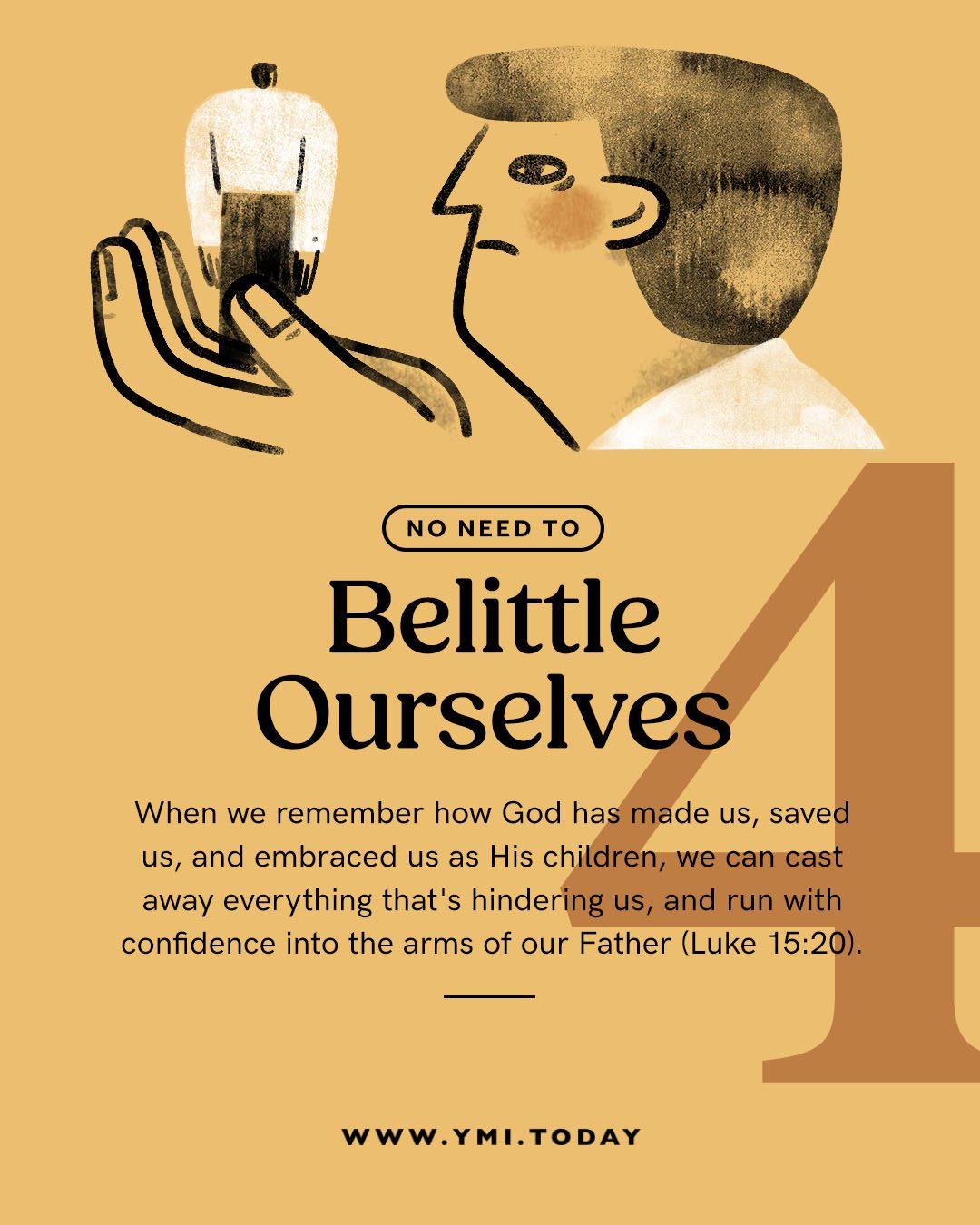4 Things We Don’t Need to Do When We Pray
Ever wondered what makes the “perfect” prayer?
Perhaps in our minds, prayers with big words will surely get God’s attention. Or maybe, we need to repent more (i.e., beat ourselves up, “Oh, woe is me”) to get Him to hear us. Or actually, maybe we shouldn’t bother Him too much, we don’t want to be a nuisance to Him.
These thoughts can hamper our prayer life because we feel we need to have things “perfect” and in “order” before going to God.
Well, the good news is, there’s no such thing as a “perfect” prayer. It’s our VIP pass to the King of Kings, enabling us to come to Him with all of our dreams, hopes, and worries.
Here are a few things we often think we should or shouldn’t be doing when we pray, but they actually matter less than we think.

1. No need to wrap it up with big fancy words
It’s time to close our small group evening with a prayer, and the person asked to pray has morphed into someone else completely. Suddenly, Christian jargons start creeping into their vocabulary as they pray, complete with a deep baritone and a strange accent.
Often we feel we need to put our best foot forward when we pray because we think God’s judging our performance, His finger ready to press the “yes” or “no” button depending on how well we say our prayers. Or perhaps under the public glare (and expectations of others), we feel the need to put on a show for fear others might judge us for our ineloquence.
However, prayer is a very personal matter, and whether it’s prayed publicly or not, it’s a matter between us and God.
God isn’t assessing our prayers before deciding if we’re worth an audience with Him, or if our requests are worth listening to. He’s already granted us access to Him (Hebrews 4:16) and He’s given us the Holy Spirit to intercede for us (Romans 8:26) when words fail. And if you feel like you don’t know what to say when you pray, you can start by praying through the Scriptures or the Psalms, to train yourself to pray and respond to God’s truth.
When Jesus taught His disciples, a group of fishermen (plus a tax collector), the Lord’s Prayer (Matthew 6:9-13)—a simple, straightforward prayer that covers all bases—this tells us that prayer is for everyone, not just the eloquent, the educated, and those “in the know”.

2. No need to sort things out first
Our life is caught in a mire of sin. We would like God to help us, but He’s holy and exalted, and we’re not. “Hmm,” we think, “We better first clean our mess up first before going to God.”
So we try as hard as we can to “cleanse” ourselves of our sins with various “detox” methods—quitting cold turkey on certain addictions in our lives (only to fall back in shortly), focusing on “positive” aspects of our lives except for the very thing that’s making us stumble. We’re caught in a vicious cycle, where we feel we haven’t cleaned up our act, so we stall another day, and another day . . . and soon we give up on going to Him altogether.
We may not think we’re like the Pharisee in Luke 18:9-14, who, confident in his own righteousness, prayed and thanked God he wasn’t like the “other people—robbers, evildoers, adulterers—or even this tax collector” (Luke 18:9-11). But in wanting to present only our “good” side to God, we may be unwittingly sharing the same mindset—thinking that when we go to God, we have to be “righteous”.
God didn’t send Jesus to die for clean, holy people. Jesus died for us while we were still sinners (Romans 5:8). And Scripture says we can confidently and boldly go into His presence (Ephesians 3:12), so in that vein, we can go to God with our life’s mess and know that He doesn’t expect us to be perfect before going to Him. All He asks of us is “a broken spirit and a contrite heart” (Psalm 51:17) as we go to Him.

3. No need to tiptoe around Him
“Ehm, sorry, God, so about that prayer request from yesterday/last month/two years ago . . . ”
Ever prayed for something and then felt bad for “disturbing” God about it because we don’t want to be like mosquitoes buzzing around His ears? We may feel like God might be bored of our requests because whenever we bring up the topic with our prayer buddies, we could almost hear them say, “Not this again!” And if they’re bored, surely God must be too?
Or perhaps we feel we haven’t completed our “duties” (prayer, quiet time, Bible reading) and don’t “deserve” to go to Him with our requests.
But that particular prayer is so important to us—maybe it’s for the restoration of a relationship, directions for a career change, or for a spouse, and we would like an answer from God.
Don’t worry, God is not about to swipe left on His phone the minute He sees us “ringing” through with the same request. Quite the opposite, God loves a persistent prayer.
Scripture talks about the persistent widow, who bothered the evil judge so much till he granted what she wanted (justice) (Luke 18:1-8), and the person who persistently knocked on his friend’s door at night asking for three loaves of bread (bread was a pretty big deal back in ancient days, it was expensive), until he was eventually given what he asked for (Luke 11:5-8). These parables point us back to our relationship with God and show the importance of persistent prayers.
J.D. Greear in his book, Just Pray, wrote:
When we pray persistently, we are showing that we have [this] conviction about God: “God, you’re the only one who can help me . . . I’m going to stand right here because You’re my only hope. Praying once or twice doesn’t demonstrate that. Praying persistently does, and so it glorifies God. That is why, I think, God is delighted by, and delighted to answer persistent prayers.”
Persistence in prayer helps us draw even closer to God and to better hear His heartbeat for us—it’s a closeness cultivated the same way when we spend lots of time with someone. In our persistence, we also continue to discover (and remind ourselves of) God’s goodness and faithfulness, which allows us to keep running back to Him.
Whatever’s heavy on your heart, come knocking and keep knocking.

4. No need to belittle ourselves
Sometimes we mistakenly think the only way to get God to listen to our prayers is if we spend a lot of time belittling ourselves. We think we’re putting on a “humble” front if we tell Him how “awful” and “unlovely” we are, and that’ll make Him be more likely to tune His ears to our prayers!
This situation might work if we’re dealing with a narcissist who gets a high from us listing all our faults before he grants us our wishes, but God isn’t a narcissist and He doesn’t expect us to pray this way.
We’re created in the image of God (Genesis 1:27), He has made us with the greatest care (Psalm 139:14), and when He looked at all He had created (including us), He declared it was very good (Genesis 1:31). So, coming to God while pointing out all our “unremarkable” traits really isn’t showing a heart of humility, but rather downplaying or dismissing what God has done for us.
There’s no need for us to belittle ourselves when we remember how He’s made us, saved us, and embraced us as His children. With that knowledge, cast away everything that’s hindering you in approaching God, and run with wild abandonment to the arms of your Father (Luke 15:20).

We know prayer is an important part of our Christian lives, but sadly, we often underuse it because we’ve set up all sorts of “barriers”—including our feelings of unworthiness, discouragement from past unanswered prayers, or the assumption that God won’t answer the way we want Him to.
When these thoughts hit, let’s find our way back into Scripture and be reminded that prayer is for us and is key for connecting with God, and we’re shaped and moulded by the time we spend with Him.










Leave a Reply
Want to join the discussion?Feel free to contribute!